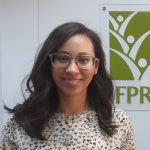9 February 2021
Dalia Elsabbagh, IFPRI Egypt

IFPRI held the 33rd seminar in the Evaluating Impact and Building Capacity seminar series on Tuesday, January 26th titled “Fostering Digitalization for a Future-Proof Food System in Egypt”. The seminar supports United States Agency for International Development’s (USAID) Agribusiness for Rural Development and Increasing Incomes (ARDII) project’s objectives.
The webinar aimed to discuss the role of digitization and digital tools in providing an opportunity to make food systems more productive and efficient, climate-smart, and inclusive. The webinar presented a global perspective on the potential that digitalization holds and presents the latest digitalization initiatives in the field of food and agriculture by the Government of Egypt (GOE).
“Smart agriculture is the 4th development phase of agriculture in history following the traditional agriculture, the mechanized agriculture, and the bio-chemical agriculture,” said Liangzhi You, Senior Research Fellow at IFPRI. During his presentation, Liangzhi highlighted the importance of the agricultural information system to measure crop yields and providing crop mapping along with normal surveys to monitor and estimate crop yields and increase the farmer’s efficiency. Such technology is already implemented by developed countries like the USA. On a smaller scale, farmers can use unmanned aerial vehicles to collect agricultural information about their lands along with sensors.
In Egypt, many government efforts supported by partnerships with the private sector and inter-governmental alliances are entering the field of agricultural digitalization, the Deputy Minister for Artificial Intelligence at the Ministry of Communication and Information Technology (MCIT), Golestan Radwan explains. The MCIT along with the Ministry of Agriculture and Land Reclamation (MoALR) started deploying Artificial Intelligence (AI) to optimize the amount of irrigation water used on small farming plots, using a combination of satellite images and machine learning models that analyze these images to identify the planted crops, their stage of growth and interpolate it with weather data and predictions. In addition, the AI is used to provide smart assistance by telling farmers how to use fertilizers, the time to start implementing certain crops, and the way of optimizing yields. Furthermore, satellite images are used to detect diseases before being highly spread, and track livestock lifecycle.
Mohamed El-Kersh, Official Spokesperson and Assistant to MoALR, affirmed that with the COVID-19 crisis, the importance of digitalization in agriculture increased. El-Kersh emphasized the importance of developing the needed infrastructure for agricultural digitalization: the hardware and the social structure for the worker, to enable agriculture workers to use the new technologies. El-Kersh highlighted the GOE’s experience of a “farmer card” that helps in tracking the farmers’ needs of fertilizers, crop production, and more, providing the government with valuable information to deliver better services.
Islam Hassan, CEO of E-Aswaaq at E-Finance, presented E-Aswaaq a website that helps small farmers in marketing and selling their products through providing proper match-making with potential buyers. The website is related to AgriMisr, a portal related to land custody, farmer card, and the market place providing an easier process for the farmer to receive loans from the Agriculture Bank in Egypt while providing a robust credit cycle delivering steady income to small farmers and increase financial accessibility.
Chandrashekhar Biradar, Research Team Leader- GeoAgro for Sustainable Agroecosystems at ICARDA, demonstrated “GeoAgro Pro” an application providing one-by-one consultations after filling the required data along with GIS data and geo-agriculture data collected through mobile phones. Biradar explained the importance of AI that is needed to have a systematic analysis to understand the data without human intervention. The mobile application also offers a platform to connect small farmers and markets.
Dorra Fiani, President of the Knowledge Economy Foundation, showcased the effort of the foundation in developing “Al-Nota” mobile application in collaboration with the Ministry of Agriculture and the Agriculture Export Council. Al-Nota is a one-stop-shop for the farmer providing him with a simplified process to enable the farmer to export his agricultural production by walking him through all the needed steps and registries for proper execution. The application is currently being tested for strawberries and will be widely used later for all export-oriented agricultural products.
Amr Moussa, Regional Manager for Technical & Regulatory Agricultural Solutions Nile & Middle East at BASF Co., demonstrated “Ardena”. Ardena is a mobile application, developed for commercial farmers and smallholders, that aims to support farmers by sending notifications about the risks of fungal diseases on tomato. The application uses artificial Intelligence, satellite data, and a dynamic disease detector to provide an early disease warning system using weather data, humidity, ground data, and the BASF expert on the ground. The early warning system unable farmers to find better agricultural results with higher yields. The app uses.
Yumna Kassim, Research Associate at IFPRI-Egypt, demonstrated the MAP Egypt digital tool. The tool is created for and with the MoALR by IFPRI as part of the “Evaluating Impact and Building Capacity” (EIBC) project, funded by USAID. MAP Egypt is an online interactive tool that provides an overview of all agricultural projects implemented in Egypt provided by their location in an interactive map. The tool differentiates between national and international projects while showing each project’s details such as costs, status, implementers, donors, and type of funding. Users can also filter the different projects on the tool by governorates or other elements. The MAP Egypt tool also provides social indicators on the governorate level.
Dalia Elsabbagh, Senior Research Assistant at IFPRI-Egypt, demonstrated the newly developed Online Agricultural Investment Data Analyzer (AIDA) tool for Egypt. The project is funded by the International Fund for Agricultural Development (IFAD) and co-financed by CGIAR-PIM. The tool enables governments, policymakers, and researchers to simulate the direct and indirect impacts of agricultural investments on the country’s GDP, employment, and households’ welfare. Online AIDA is based on a computable general equilibrium (CGE) model that uses the social accounting matrix (SAM) to calculate the estimated impacts taking into consideration all the linkages in the economy. The tool will be soon launched for public use in four countries: Egypt, Jordan, Tunisia, and Yemen.
